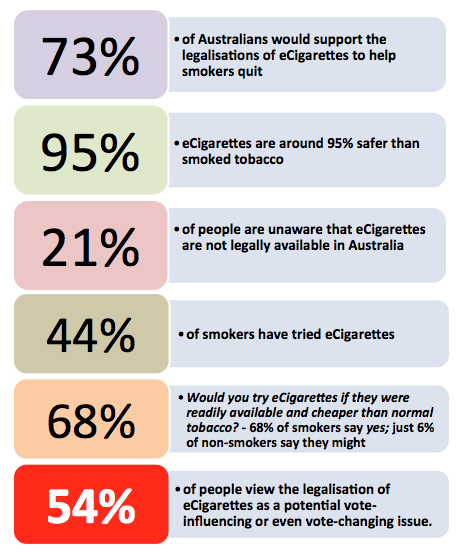The Australasian Association of Convenience Stores (AACS) has questioned the Therapeutic Goods Administration’s (TGA) decision to uphold the ban on liquid nicotine in e-cigarettes, claiming it is putting the health and lives of Australian smokers at risk.
AACS CEO said the decision defies belief and the TGA can no longer claim to have the best interests of smokers and the health of Australians at heart.
“The available evidence clearly shows that e-cigarettes are significantly safer than traditional tobacco products and that they have helped millions of people around the world cut down and quit smoking. Denying Australian smokers this alternative is reckless in the extreme,” Mr Rogut said.
“It makes no sense to provide smokers less alternatives to help them cut down and quit. If we are serious about reducing the incidence of smoking we should be providing smokers more options.
“The AACS urgently calls for a Government review of this absurd decision and if need be, to take the responsibility for overseeing the regulation of e-cigarettes away from the TGA in favour of an authority with the capacity to understand and respond to the available evidence with smokers’ interests at heart.
“The fact that this decision was passed in secret, without any of the typical fanfare, offers an embarrassing insight into the TGA’s decision making. This is a reckless decision that sets Australia on a backward course in terms of helping smokers, while other countries move forward,” he said.
The TGA decision is particularly baffling considering the groundswell of support for the legalisation of e-cigarettes not only from health professionals but also from consumers.
To quote an article in the media just this week featuring comments from University of NSW School of Public Health Tobacco Treatment Specialist Dr Colin Mendelsohn:
By contrast Associate Professor Mendelsohn assesses the typical cost of “vaping” or using nicotine e-cigarettes for the same period would be $1,150 per year — an annual saving of $6,150 for every smoker who switched….Scientific studies have also found that vaping is 95 per cent safer than smoking but the TGA last month upheld a rule banning liquid nicotine — even though cigarettes riddled with deadly cancer-causing substances are still freely available.
“So vaping is at least 85 per cent less expensive than smoking and 95 per cent safer. You will be richer and healthier if you make the switch to vaping,” Associate Professor Mendelsohn reportedly said.
Research commissioned by the AACS and undertaken in September 2016 shows that Australians are overwhelmingly in support of legalising e-cigarettes if they can help smokers quit, with more than half of Australians feeling so strongly about the issue that it could influence their vote.
The AACS research – the most extensive ever undertaken on the topic of e-cigarettes in Australia – shows that 54% of Australians view the legalisation of e-cigarettes as a potential vote-influencing or even vote-changing issue. It also shows that 73% of Australians would support the legalisation of e-cigarettes to help smokers quit.
Other reasons cited in support of legalising e-cigarettes include: so family members of smokers including children don’t have to live in a smoke-filled environment; and to reduce the burden on the health system, freeing up hospital beds and money for other patients awaiting treatment.
“The development of a framework to govern the legal sale of e-cigarettes is urgently required to bring Australia in line with the rest of the world,” Mr Rogut said.
In 2016, Public Health England and numerous other UK public health organisations released a joint statement on developing a public health consensus on e-cigarettes, products they state “are the most popular quitting tool in the country with more than 10 times as many people using them than using local stop smoking services”.
A Public Health England study from 2015 shows that e-cigarettes – which do not contain tobacco – are around 95% safer than conventional cigarettes.
Elsewhere, the New Zealand Government has indicated it will regulate for e-cigarettes. But for reasons unfathomable to most Australians, including Dr Colin Mendelsohn, the TGA is seeking to ensure Australia lags the rest of the world.
“There is a groundswell of health professionals and experts from around the world who recognise that e-cigarettes are among the most widely used and effective products to help people quit smoking. If they have the potential to assist even a proportion of smokers to reduce or quit smoking tobacco, then we need to give these products a chance to help,” Mr Rogut said.
Mr Rogut said there is a growing black market for illicit e-cigarette products, as there is for tobacco products, emphasising the urgent need to develop a proper legal framework.
“In addition to developing a framework for the responsible sale of e-cigarettes to provide adult consumers a healthier, safer choice, we believe other safe stop-smoking products such as nicotine gums and patches should be more readily available as well,” Mr Rogut said.
“Otherwise, as we’ve seen with the dramatic rise of the illicit trade of tobacco in Australia, criminal gangs will invariably fill the gap in the legal market with untested and potentially unsafe products.”
The AACS has identified several key considerations in the legalisation of e-cigarettes, including restrictions in sales to minors, ensuring e-cigarettes and associated products are child tamper proof, contain an ingredients list, comply with quality standards and are manufactured and sold with strict safety standards in place.
A breakdown of the key AACS research findings into e-cigarettes is included overleaf.

Subscribe to our free mailing list and always be the first to receive the latest news and updates.
